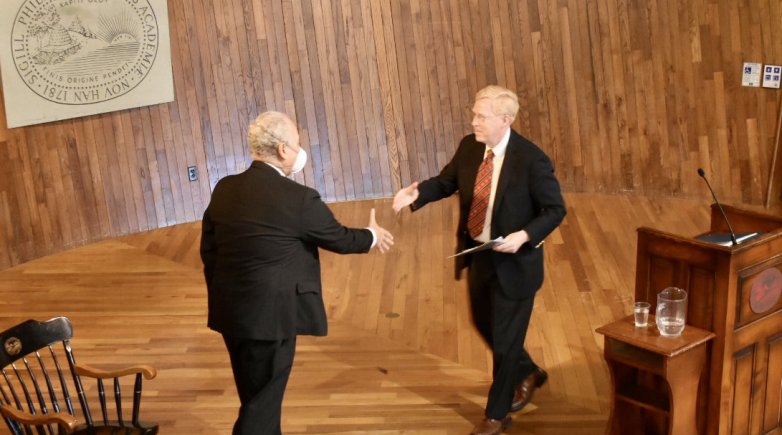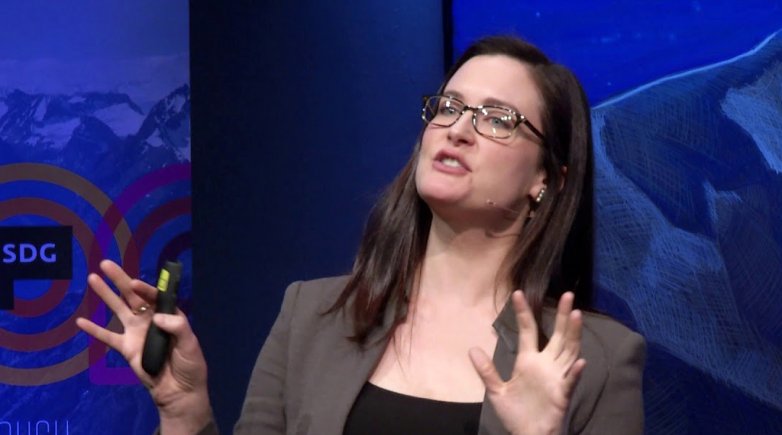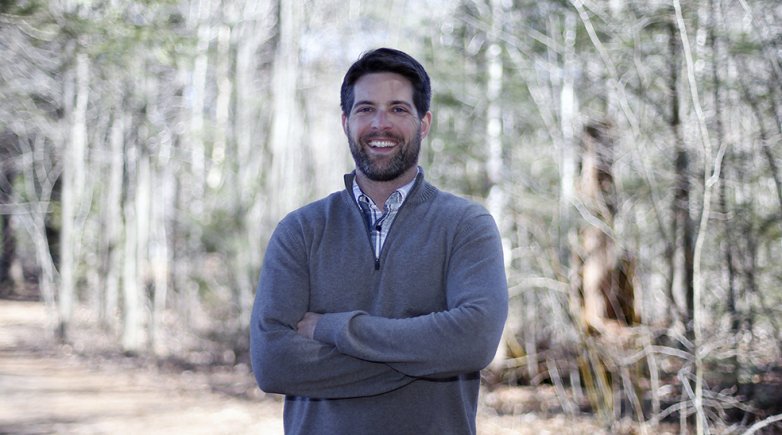Environmental lawyer asks, 'Are you willing to fight?'
Ben Wilson tells Exeter "future generations are counting on you" to make a difference against climate change.
Principal Rawson welcomes environmental attorney Ben Wilson to the Assembly Hall stage on March 24, 2023.
Friday morning at assembly, the Exeter community was treated to remarks and a question-and-answer session with Ben Wilson, one of the nation’s pre-eminent environmental lawyers.
Wilson, recently retired from his law practice in Washington, D.C., grew up in Jackson, Mississippi, and graduated from Dartmouth College and Harvard Law School. In 2012, he co-founded the African American General Counsel and Managing Partners Network. He is a former chairman of the Environmental Law Institute and he continues to teach law at Howard University School of Law.
“Throughout his career, Mr. Wilson was widely admired for his legal abilities and many professional accomplishments, but he was also widely admired by competitors and colleagues alike for his integrity, his goodwill and cheer,” Principal Bill Rawson said in introducing his longtime friend and associate.
Wilson’s full assembly address can be viewed here. Below is an excerpt of his remarks to Exeter:
You need not have me tell you that climate change is the defining issue of our time. It is the defining issue of your time. You need not be reminded of the rising temperatures predicted by 2050. You are aware of the raging fires and the record storms in the American West, the record temperatures in Europe this past summer, and the decline of the Arctic Sea ice and the glaciers. And you are also very much aware of the impact of the monsoon season in Asia and the hurricane season in the Gulf on the economy of those regions, you must be mindful the trans-boundary impact of environmental harm and the utterly devastating impact of war upon the environment and millions of people in Ukraine and the Middle East.
But I hope here at Exeter that you are aware that the problem within the problem of climate change is the issue of climate justice. There can be little doubt that the impact of climate change falls disproportionately on the poor and on people of color. And too seldom do those communities experience the benefits of adaptation, mitigation and climate investments. This need not be the case. Stated simply, we can no longer tolerate these ongoing injustices such as the water crisis in Flint and more recently in my hometown of Jackson, Mississippi. To meet these challenges, our institutions and organizations need to evolve. I understand there are courses on the environment taught here at Exeter. At our Environmental Law Institute, we are showing growing support for environmental justice. And I applaud the efforts of EPA to establish a national office charged with an advancing environmental justice and civil rights to focus more attention and resources on underserved communities.
So, my question to you this morning is not whether these challenges exist, but does it matter to you if we seek to change them? As Dr. King suggested so many years ago, the measure of a man, or a woman, is not where he stands in moments of comfort and convenience, but where she stands at times of challenge and controversy. So, my question to you this morning is where do you stand? Have you already thrown in the towel on your capacity to mitigate climate change? Are you no longer willing to think globally and act locally? Do you believe that injustice anywhere is injustice everywhere? Do you still believe in the rule of law? Are you willing to fight? I'm glad to consider these questions with you. I believe the answer to them is not blowing in the wind, as Bob Dylan would say. I believe there's still time to make a difference on climate change and climate justice.
You see, I have to be able to look my grandson, he's 2 years old, his name is Cameron. I have to look him in the eye when I answer his eventual question, "What did you do, grandpa, to address the great issues of your time, climate change and climate justice?" You see, in just a generation, we will all know our answer to these questions. Finally, and I'm near the end, if you wish to know why your answer is so important, please know that somewhere in the world today, this morning, perhaps in Accra, Berlin, Bombay, São Paulo, Shenzhen, Washington D.C., Exeter, New Hampshire, a young couple is traveling tomorrow, no, not tomorrow, this afternoon, to start a new life. Their car is packed to the gills. There is barely enough room to sit. A bouncing baby girl is buckled safely in her car seat. Can you see her?
So let us to resolve that by her 18th birthday, the companies that some of you will start, that you will lead, the boards on which you will sit as well as the governments you will lead, have kept their promises on climate change. Let us resolve that by 2050, we in fact have achieved a promised net positive impact on the environment. Let us commit to getting this work done with equity and justice in mind so that the benefits of our work are equally shared and the burdens are not disproportionately placed on the most vulnerable. You see, the world is watching. That little girl and her parents are counting on us. They and future generations are counting on us. They are counting on you. Thank you for your attention.



